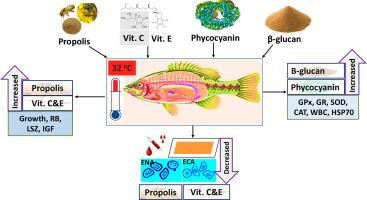Aquaculture ( IF 4.5 ) Pub Date : 2021-07-07 , DOI: 10.1016/j.aquaculture.2021.737153 Md Jakiul Islam 1, 2, 3 , Andreas Kunzmann 1 , Joachim Henjes 2 , Matthew James Slater 2

|
Extreme climatic events affect all living organisms, including fish. This study evaluated growth, hematological, immune-antioxidant, and molecular stress responses to understand the acclimatization ability of European seabass, Dicentrarchus labrax fed on four different dietary supplements with subsequent exposure to an extreme ambient warm (32 oC) event. Fish were fed on diets supplemented with vitamins C (0.40%) and E (0.35%), propolis (0.45%), phycocyanin (0.30%), and β-glucan (0.30%) along with a control diet for 56 days, followed by 18 days of extreme warm exposure. Fish growth performance and survival were higher in fish fed on propolis followed by vitamins C & E and phycocyanin supplemented diets compared to fish fed on the control diet. During extreme warm exposure, red blood cells (RBC), hematocrit, hemoglobin, respiratory burst (RB), serum lysozyme activities (LSZ), and insulin-like growth factor 1 (Igf1) were significantly (P < 0.05) higher in fish fed on diets supplemented with propolis, vitamins C & E, and phycocyanin compared to fish fed on control diet. On day 18 of extreme warm stress, blood glucose and lactate levels were significantly higher in fish fed on control and β-glucan supplemented diets compared to the other three tested diets. On days 9 and 18, erythrocytic cellular abnormalities (ECA) and nuclear abnormalities (ENA) were significantly increased in fish fed on control and β-glucan diets (P < 0.05). Heat shock protein 70 (HSP70) and serum antioxidant enzymes [superoxide dismutase (SOD), glutathione peroxidase (GPx), catalase (CAT), and glutathione reductase (GR)] activities were comparatively lower in fish fed on propolis and vitamins C & E supplemented diets compared to the control diet on days 9 and 18 of extreme warm stress. Most of the repeatedly measured parameters indicated that European seabass fed on diets supplemented with propolis, vitamins C & E, and phycocyanin provide improved acclimation potential during extreme ambient warm (32°C) exposure.
中文翻译:

饮食控制可以减轻鱼的极端热应激吗?欧洲鲈鱼Dicentrarchus labrax的案例
极端气候事件影响所有生物,包括鱼类。本研究评估生长,血液学,免疫系抗氧化剂,和分子应激反应了解欧洲海鲈的驯化能力,粗养供给四种不同的膳食补充剂,随后暴露于极端的环境温的(32 öC) 事件。用补充维生素 C (0.40%) 和 E (0.35%)、蜂胶 (0.45%)、藻蓝蛋白 (0.30%) 和 β-葡聚糖 (0.30%) 的饮食喂养鱼以及对照饮食 56 天,然后通过 18 天的极端温暖暴露。与喂食对照饮食的鱼相比,喂食蜂胶的鱼的生长性能和存活率更高,其次是补充维生素 C 和 E 以及藻蓝蛋白的饮食。极端温暖暴露期间,红细胞(RBC)、血细胞比容、血红蛋白、呼吸爆发(RB)、血清溶菌酶活性(LSZ)和胰岛素样生长因子1(Igf1)显着(P < 0.05) 与饲喂对照饮食的鱼相比,饲喂添加蜂胶、维生素 C 和 E 以及藻蓝蛋白的饲料的鱼更高。在极端温暖压力的第 18 天,与其他三种测试饮食相比,以对照和 β-葡聚糖补充饮食喂养的鱼的血糖和乳酸水平显着更高。在第 9 天和第 18 天,以对照和 β-葡聚糖饮食喂养的鱼的红细胞异常(ECA)和核异常(ENA)显着增加(P < 0.05)。喂食蜂胶和维生素 C 和 E 的鱼的热休克蛋白 70 (HSP70) 和血清抗氧化酶 [超氧化物歧化酶 (SOD)、谷胱甘肽过氧化物酶 (GPx)、过氧化氢酶 (CAT) 和谷胱甘肽还原酶 (GR)] 活性相对较低在极端热应激的第 9 天和第 18 天,补充饮食与对照饮食相比。大多数重复测量的参数表明,以补充蜂胶、维生素 C 和 E 以及藻蓝蛋白的饮食为食的欧洲鲈鱼在极端环境温暖 (32°C) 暴露期间提供了更好的适应潜力。


























 京公网安备 11010802027423号
京公网安备 11010802027423号